Democratic Republic Of Congo
Ugandan troops stepped up their deployment in eastern DR Congo on Wednesday, witnesses said, on the second day of an operation against the notorious ADF rebel group launched in cooperation with Kinshasa.
"They are arriving aboard armoured cars, with escorts from members of the local security services," Tony Kitambala, a freelance journalist based in North Kivu province, said at Nobili on the border.
Ugandan soldiers were seen crossing there into the Democratic Republic of Congo (DRC) on Tuesday after their armed forces launched air and artillery strikes from Ugandan territory.
The target is the Allied Democratic Forces (ADF) -- a group blamed for massacres in eastern DRC and attacks in the Ugandan capital, and which the Islamic State group claims as an affiliate.
The DRC at the weekend said through a presidential advisor that it approved a Ugandan offer to pursue the ADF on its soil, where the group has holed up since the mid-1990s.
An aid worker in Nobili said "air strikes on ADF positions continued last evening" but the situation was calm on Wednesday.
"This morning, the UPDF (Ugandan armed forces) has been reinforcing its troops with men, ammunition and military trucks," he said.
DRC's army spokesman Leon Richard Kasonga told reporters late Wednesday that "we bombarded terrorist camps in the forest".
"We are on the ground for far-reaching operations," he added, without providing any details about the number of troops being deployed or how long the mission will last.
A senior DRC military officer said Congolese troops were heading towards Beni, the capital of North Kivu province, from neighbouring South Kivu.
The bombardments aimed at several ADF positions in North Kivu and neighbouring Ituri province to the northeast.
On Tuesday, the Ugandan armed forces spokesman said the bombardments had successfully hit their targets, and that ground operations would hunt down "terrorists."
- Massacres and blasts -
The ADF was historically a Ugandan rebel coalition whose biggest group comprised Muslims opposed to Ugandan President Yoweri Museveni.
The group established itself in eastern DRC in 1995, later becoming the deadliest of scores of outlawed forces in the troubled region.
DR Congo's Catholic Church says the ADF has killed around 6,000 civilians since 2013 while a respected monitor, the Kivu Security Tracker, blames it for more than 1,200 deaths in the area alone since 2017.
The Ugandan authorities have accused the ADF or a local group affiliated with it of carrying out or planning a string of attacks this year.
On November 16, four people were killed and 33 wounded in twin suicide bombings in Kampala. Police blamed the blast on a "domestic terror group" that it said was linked to the ADF.
Since April 2019, some ADF attacks in eastern DR Congo have been claimed by IS, which describes the group as its Islamic State Central Africa Province offshoot.
In March, the United States placed the ADF on its list of "terrorist" organisations linked to IS.
- Relief but concern -
Uganda's intervention has come despite a crackdown on the ADF by the Congolese armed forces, launched two years ago.
That has been followed by a "state of siege" in North Kivu and Ituri since early May under which senior civilian officials have been replaced by military or police.
Residents said they welcomed the offensive against the ADF but hoped the operation would open the way to peace.
"I am very happy at the arrival of the Ugandan troops in our country," said Nobili resident Jospin Dongo.
Another resident, Mugisa Kitambala, said, "The main thing as far as I am concerned is that we have peace once more.
"But they also have to tell us how long the mission will last and how many (troops) have entered, so that at the end, we can know that they've gone home."
The notion of Ugandan troops operating on DRC soil is controversial in a country where many recall the role of Uganda and Rwanda in stoking past instability in the east of the country.
Denis Mukwege, the DRC gynaecologist who won the 2018 Nobel Peace Prize for his work helping victims of sexual violence in South Kivu, said the DRC-Uganda agreement was "unacceptable."
There have been "25 years of mass crimes & looting of our resources by our neighbours," he said in a tweet. "Congolese, stand up, the nation is in danger!"
Other prominent figures have questioned the lack of transparency behind the agreement, which was reached without consultation with parliament or even a statement by President Felix Tshisekedi to announce it.
"Relationships between countries evolve," government spokesman Patrick Muyaya said Wednesday.
"We understand our countrymen's concerns" but "have made the choice to move forward," he added.




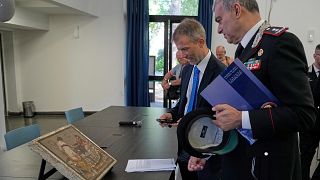
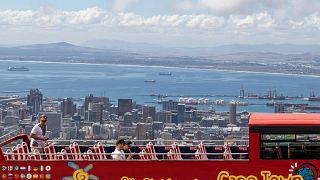

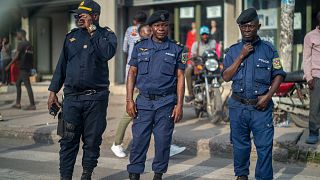
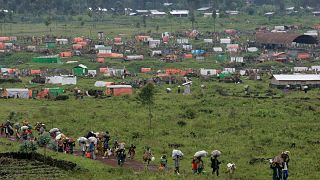



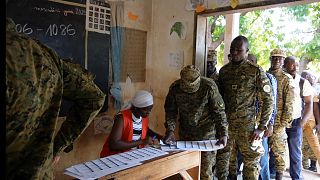
02:35
Central African Republic's major rebel groups to disarm, dissolve
00:59
DR Congo's new opposition coalition launched in Kinshasa
01:20
Amnesty International accuses DR Congo's M23 rebels of possible war crimes
Go to video
DR Congo may impose curbs on cobalt exports when existing ban ends
Go to video
DRC: M23 rebels seize strategic town despite peace talks
Go to video
Heavy rains flood Congo's capital, killing at least 22 people